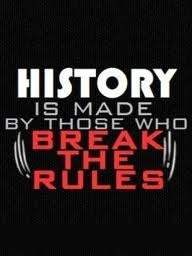Commission-driven salespeople who depend on quota fulfillment to keep their jobs on a revenue treadmill that increases its speed year to year will never be trusted advisors to clients. That won’t change until the basic ‘culture of engagement’ for sales forces changes. ~ Andrew Rudin
 The two part series on sales professionalism received a great deal of welcomed and insightful commentary. Thanks to those who engaged in the conversation and pointed out a couple of keys issues to some of my conclusions.
The two part series on sales professionalism received a great deal of welcomed and insightful commentary. Thanks to those who engaged in the conversation and pointed out a couple of keys issues to some of my conclusions.
The above quote was one of the more succinct comments. In this quote, Andrew Ruden identifies the most critical contradiction in the sales profession — we incentivize sales people to make deals and the pressure to make deals increases constantly. Until we change the system we can’ fix the problem. Precisely!
Improving sales professionalism means changing the “sales engagement culture”. Though it is not politically correct to stereotype people these days — we expect sales people to exhibit certain sales behaviors; often they don’t disappoint us. Imagine an environment where the salesperson did behave completely differently — would we see them differently? Probably not. It is because we are permanently wired to view salespeople in historical context to a certain type of personality, behavior, habits, and style. This merely reinforces the historical culture and perpetuates the notion that salespeople need to act and behave and engage in a certain way. Not so!
We can change, we have changed, and we can be trusted professionals provided you reward those of us who engage appropriately. How many times have we told our children what we wish they would do, “just once”; and, when they do it we barely acknowledge it. Our children’s perception is that you didn’t even notice, it didn’t make a difference, so why should I do that again? Same for our sales professionals. Would we even be willing, able, or committed to acknowledge great sales behaviors when we see it? I am not sure.
The problem with the whole sales professionalism issue is, like Rudin says, cultural engagement. Here are some of the bigger challenges and fixes:
- Management: Leadership wants results. They want their salespeople to generate leads, crank out proposals, and close deals. That is their job. Most sales training programs applied today focus on getting results through this process. In today’s sales culture this is not how great, lasting, sustainable results are achieved; hence, it is not how sales professionals need to be trained. However, most managers have not been in the sales arena for a long time, if ever, and are not in a position to take the “risk” of investing in training and developing a productive selling culture reflective of the shifts in buying and purchasing attitudes. As a result, the same old is perpetuated and the cycle lives on.
- Purchasing: The purchasing behaviors of organizations make the deal the only aspect of the relationship. Submit RFQ’s and sell on specs developed and evaluated by people who would not know what a real solution looks like. Instead of shifting to a process that rewards organizations who know how to identify and solve problems, who know how leverage internal and external resources to create business relationships, and who are incredible at customer experience and engagement, businesses have created a bureaucratic, numbers driven process that rewards dealmaking and then complains that its salespeople are simply order takers. Engage a team of professionals in the research and buying process and have them select solutions providers who demonstrate great relationship building, solutions oriented skills and abilities and experience.
- Stereotyping: Quit looking at salespeople in historical context. Choose the people you hire or do business with based on the skills and abilities you expect and desire, not the ones your historically have experienced. To change the game, you have to change the rules. To change the rules, you have to create new rules and abide by them. Don’t blame the sales profession for giving you what you simply expect from past experience — demand what you expect and reward those behaviors when they are delivered.
Changing the customer engagement is not easy. However, facilitating the changes that need to be made require a revolutionary overhaul in attitudes, perceptions, processes, and recognition. Until then, we will be and are on a hampster wheel of unprofessional behavior that will not change until the culture of engagement changes. Change the game, change the rules, change the results and the see what happens.
Congratulations
Your first AWS Elastic Beanstalk Node.js application is now running on your own dedicated environment in the AWS Cloud
This environment is launched with Elastic Beanstalk Node.js Platform
What’s Next?
- AWS Elastic Beanstalk overview
- AWS Elastic Beanstalk concepts
- Deploy an Express Application to AWS Elastic Beanstalk
- Deploy an Express Application with Amazon ElastiCache to AWS Elastic Beanstalk
- Deploy a Geddy Application with Amazon ElastiCache to AWS Elastic Beanstalk
- Customizing and Configuring a Node.js Container
- Working with Logs
